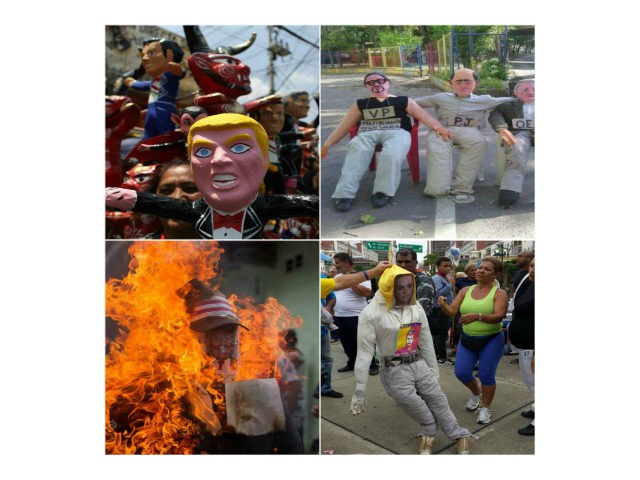After Venezuelan dictator Nicolás Maduro repeatedly referred to the anti-socialist opposition as “the antichrist,” the leader of Maduro’s party in the legislature posted a photo of Hugo Chávez on social media to celebrate Easter, with the caption “Christ is Chavista.”
Diosdado Cabello, the minority leader in the National Assembly, posted the meme on Instagram Sunday, featuring an image of Hugo Chávez with a blurred statue of Jesus in the background. Cabello did not add a comment of his own, but his followers and other Instagram users responded to the post with insults towards the socialist leader:
Cabello was once the nation’s second-in-command as the majority leader of the National Assembly before the opposition took over the legislature in late 2015. He remains minority leader, however, and an authoritative member of the Maduro regime. To limit the power of the opposition-controlled legislature, Maduro’s Supreme Court has attempted to invalidate its election on multiple occasions and, this month, attempted to appoint itself the nation’s legislative body.
In addition to Cabello’s social media post, the Venezuelan government used the occasion of the Burning of Judas – a tradition in which Christians burn an effigy of Judas Iscariot – to burn effigies of U.S. President Donald Trump, according to the official government news website. The site claims the burning of Trump was necessary to denounce “all his lies and deceits of the American people and the nations of the world when he said he would end war.”
During his Easter address Sunday, dictator Maduro declared victory over “the Venezuelan right’s … antichrist spokesmen,” whom he claimed “maintain an agenda of agitation, violence, [and] destabilization.”
This year’s Holy Week featured some of the most violent repression of anti-socialist dissidents in the history of socialist Venezuela. On Holy Wednesday, chavista thugs known as “colectivos” stormed into a Caracas basilica and shoved Archbishop of Caracas Cardinal Jorge Urosa Savino in the middle of Mass, attacking a congregation of dissident leaders who had gathered to observe the Catholic tradition there. The thugs looted the church but failed in injuring Urosa. Maduro blamed the incident on the opposition, though no eyewitnesses testified to seeing any violent acts by them. The incident recalled a similar one in February in which colectivos interrupted a Mass in Caracas to force believers to listen to a pro-socialist, pro-Maduro rant.
The injection of Chávez into Catholic mythology has gone on for years under Maduro. This Christmas, the government debuted a modified Christmas carol celebrating the CLAP, socialist ration brigades that distribute food to party members, discouraging hungry Venezuelans from joining the opposition. In a particularly egregious incident in 2014, Maduro’s party debuted a version of the Lord’s Prayer that addresses Chávez instead of God and begins “our Chávez who art in Heaven.” The Catholic Church condemned the modified prayer as a crime of “idolatry.”
While Marxism and Christianity are by definition incompatible, as Marx eschewed religion, the United Socialist Party of Venezuela (PSUV) has long claimed to be a Christian party while incorporating late dictator Hugo Chávez into Christian dogma. The U.S. State Department estimates that 99 percent of the population of Venezuela is Christian, with 70 percent belonging to the Catholic Church.
The Vatican has become heavily involved in negotiations between Maduro and the opposition. The Democratic Unity Roundtable (MUD), a coalition of opposition parties with ties to the Socialist International, attempted to engage the Maduro regime through the Vatican for a year before abandoning the project in December 2016, calling the government “rude” and the talks “mockery.” During the talks, Pope Francis met with Maduro at the Vatican but failed to personally address a protest by the wives of political prisoners at the Vatican in December.

COMMENTS
Please let us know if you're having issues with commenting.